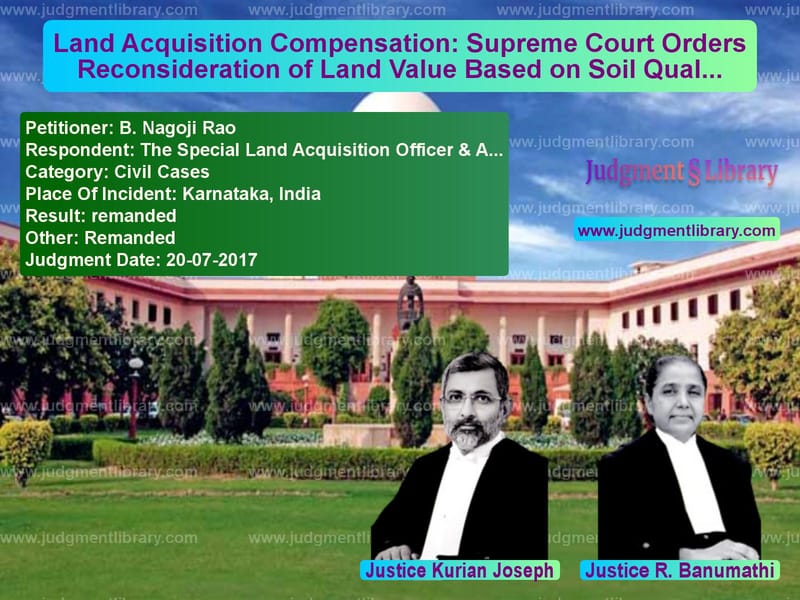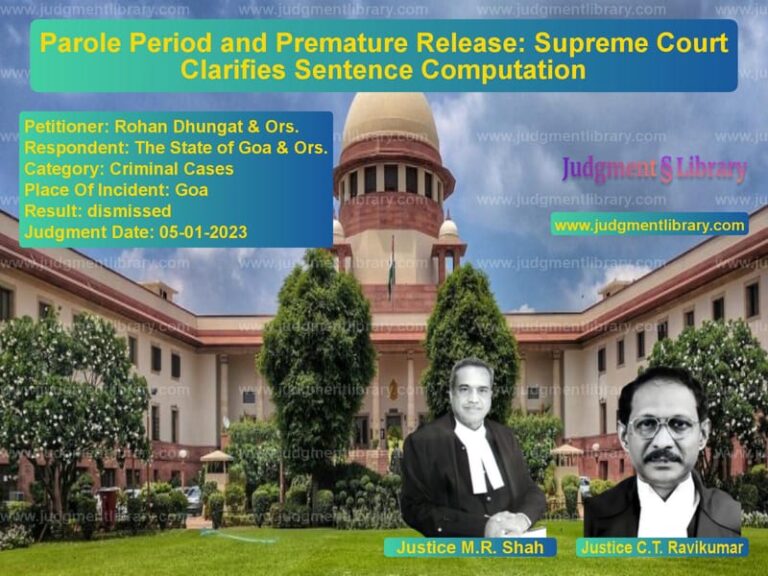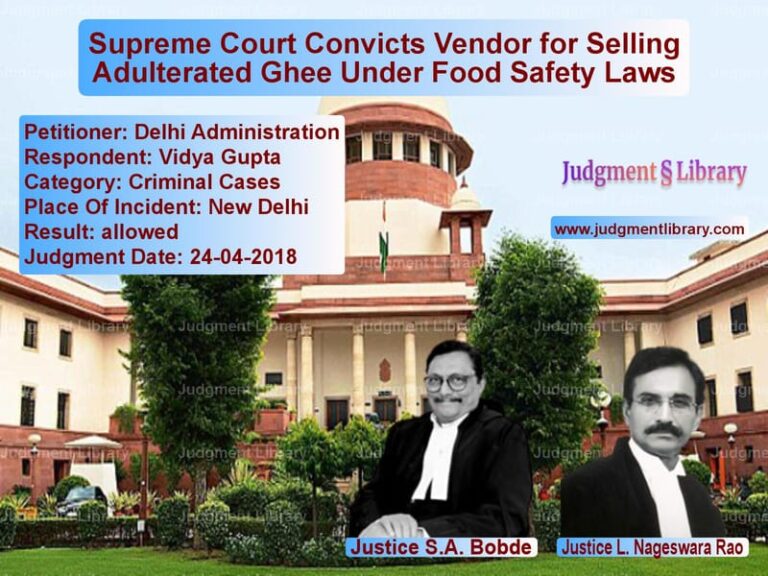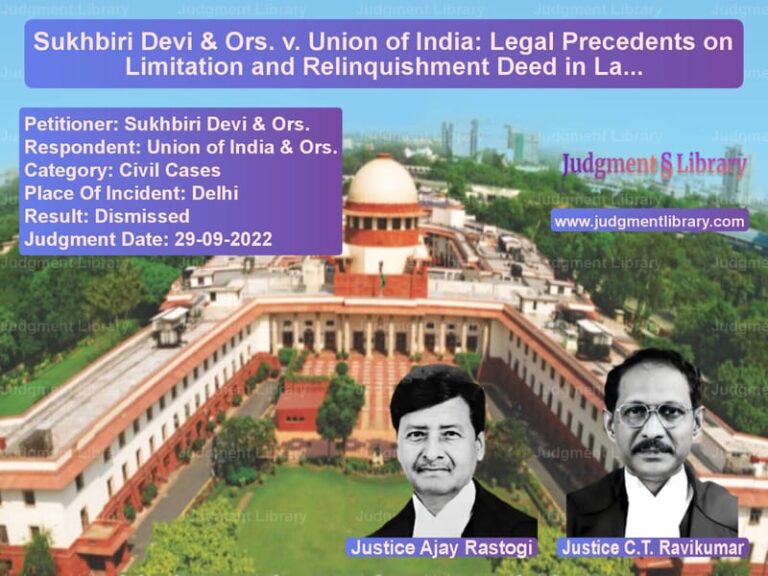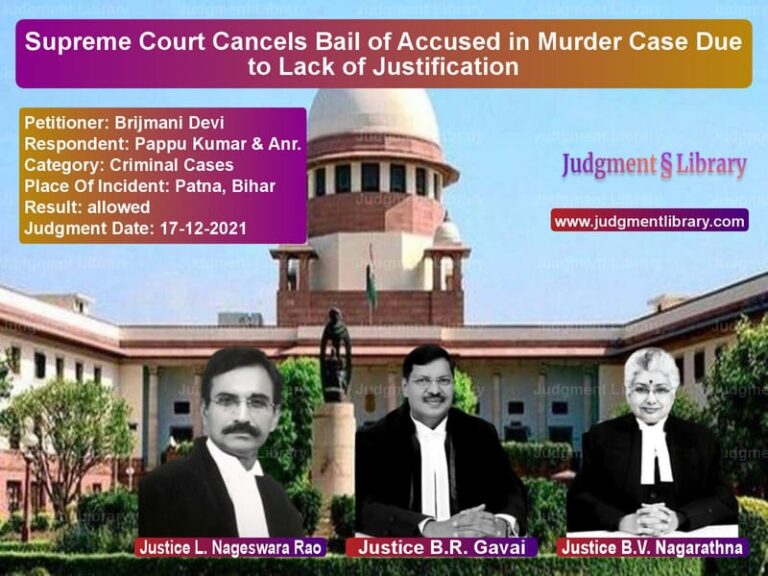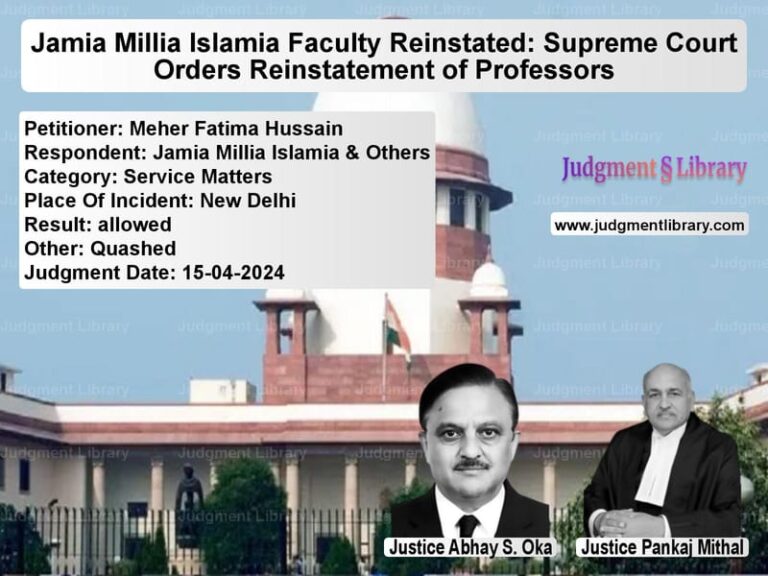Land Acquisition Compensation: Supreme Court Orders Reconsideration of Land Value Based on Soil Quality
The Supreme Court of India recently ruled on a significant land acquisition dispute involving compensation for agricultural land. The case, filed by B. Nagoji Rao against the Special Land Acquisition Officer, centered on whether the value of acquired land should be determined based on the type of crop grown at the time of acquisition or the intrinsic quality of the land itself. This judgment highlights key aspects of land valuation, fairness in compensation, and procedural delays in judicial proceedings.
Background of the Case
The petitioner, B. Nagoji Rao, owned agricultural land that was acquired by the government for development purposes. The main issue in the case was the disparity in compensation awarded to landowners based on the type of crop they were cultivating at the time of notification under Section 4(1) of the Land Acquisition Act.
Rao and other appellants argued that their land, which was being used for sugarcane cultivation at the time of acquisition, was valued at Rs. 2.38 lakhs per acre, while adjacent lands, which had arecanut plantations, were awarded a significantly higher compensation of Rs. 10.08 lakhs per acre.
Due to this discrepancy, the appellants filed a case before the High Court of Karnataka, seeking uniform compensation based on land quality rather than the crop type at the time of acquisition. The High Court, however, ruled against them, prompting them to appeal to the Supreme Court.
Arguments of the Petitioner
The petitioners presented the following arguments:
- Compensation should be determined based on the quality of the land rather than the crop grown at the time of acquisition.
- Their land was of similar quality to that of adjacent plots where arecanut was cultivated, yet they received lower compensation.
- The disparity in compensation violated the principle of fairness and equality in land acquisition proceedings.
- The High Court failed to consider crucial evidence regarding soil quality and its impact on the valuation of land.
Arguments of the Respondent
The Special Land Acquisition Officer countered these claims with the following arguments:
- The land was valued based on the crops grown at the time of notification.
- Not all adjacent lands had arecanut plantations, and some also had sugarcane cultivation.
- The compensation awarded was in accordance with the prevailing valuation norms.
- There was no conclusive evidence proving that the land used for sugarcane cultivation was of the same quality as the land used for arecanut plantations.
Supreme Court’s Analysis and Judgment
The Supreme Court examined the key issue of whether land valuation should be based on its intrinsic quality or the specific crop grown at the time of acquisition.
In its judgment, the Court observed:
“The contention raised by the appellants is that the land value should depend upon the quality of the land and not based on the crop which has been grown in the land at the time of Section 4(1) notification. What is material is the quality of the land, and it does not necessarily depend on the crops grown at a particular time or season.”
The Court acknowledged that there was evidence suggesting that adjacent lands with arecanut plantations had received higher compensation, while lands with sugarcane cultivation had been undervalued. Given this, the Court ruled that the matter required further examination.
Key Directives of the Supreme Court
- The High Court must reconsider the case, taking into account the actual quality of the land rather than solely relying on the crop grown at the time of acquisition.
- The petitioners are entitled to present additional evidence to establish the similarity between their land and the adjacent lands that received higher compensation.
- If the High Court determines that the land quality is comparable to that of the lands where arecanut was grown, then the petitioners must be granted similar compensation.
- To ensure fair proceedings, both parties will have the opportunity to submit further contentions and refer to previous judgments concerning adjacent land compensation.
- In the event of an increase in compensation, the petitioners will not be entitled to statutory benefits for the period of delay before both the High Court and the Supreme Court.
Final Verdict
The Supreme Court set aside the High Court’s ruling and remanded the matter for fresh consideration. The High Court was directed to analyze the soil quality of the disputed lands and determine whether the petitioners were entitled to the same compensation as those who had received higher amounts.
Implications of the Judgment
This ruling has significant implications for land acquisition cases across India:
- Reinforces the principle that land valuation should be based on intrinsic land quality rather than temporary factors such as the crop being grown at a given moment.
- Protects the rights of landowners by ensuring that compensation is determined fairly and equitably.
- Sets a precedent for other land acquisition cases where disparities in compensation arise due to different agricultural uses of land.
- Encourages a more comprehensive approach to land valuation, preventing potential manipulation of compensation rates based on seasonal cultivation.
This judgment underscores the importance of fairness in land acquisition proceedings and ensures that landowners are adequately compensated based on the true value of their property.
Don’t miss out on the full details! Download the complete judgment in PDF format below and gain valuable insights instantly!
Download Judgment: B. Nagoji Rao vs The Special Land Acq Supreme Court of India Judgment Dated 20-07-2017.pdf
Direct Downlaod Judgment: Direct downlaod this Judgment
See all petitions in Property Disputes
See all petitions in Damages and Compensation
See all petitions in Landlord-Tenant Disputes
See all petitions in Judgment by Kurian Joseph
See all petitions in Judgment by R. Banumathi
See all petitions in Remanded
See all petitions in Remanded
See all petitions in supreme court of India judgments July 2017
See all petitions in 2017 judgments
See all posts in Civil Cases Category
See all allowed petitions in Civil Cases Category
See all Dismissed petitions in Civil Cases Category
See all partially allowed petitions in Civil Cases Category

